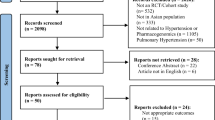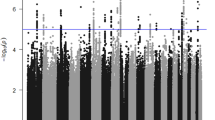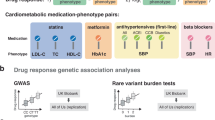Abstract
The genes in the renin–angiotensin system are important physiologic candidates in studies of the genetic susceptibility to hypertension. Limited information has been available in most studies on the extent of variation in the candidate loci or the modifying effects of different environmental settings. We consequently genotyped 13 polymorphisms at the angiotensin I-converting enzyme (ACE) locus at an average distance of 2 kb in 2776 family members from Nigeria, Jamaica and an African-American community in the US. Allele and haplotype frequencies were similar in the three populations, with modest evidence of European admixture in the US. Two markers were consistently associated with ACE level in the three samples and the proportion of variance accounted for by ACE8 was similar in the three groups. No evidence of consistent association of single markers was noted with blood pressure across the three population samples, however. Likewise, in a haplotype-based analysis, despite significant associations within each population, the findings were not replicated consistently across all three samples. We did observe, however, that the overtransmitted haplotypes among hypertensives were drawn from a single clade, suggesting that susceptibility may cluster in patterns not captured directly by our markers.
Similar content being viewed by others
Log in or create a free account to read this content
Gain free access to this article, as well as selected content from this journal and more on nature.com
or
References
Krushkal J, Ferrell R, Mockrin SC, Turner ST, Sing CF, Boerwinkle E : Genome-wide linkage analyses of systolic blood pressure using highly discordant siblings. Circulation 1999; 99: 1407–1410.
Lohmueller KE, Pearce CL, Pike M, Lander ES, Hirschhorn JN : Meta-analysis of genetic association studies supports a contribution of common variants to susceptibility to common disease. Nat Genet 2003; 33: 177–182.
Xu X, Rogus JJ, Terwedow HA et al: An extreme-sib-pair genome scan for genes regulating blood pressure. Am J Hum Genet 1999; 64: 1694–1701.
Rice T, Rankinen T, Province MA et al: Genome-wide linkage analysis of systolic and diastolic blood pressure: the Quebec Family Study. Circulation 2000; 102: 1956–1963.
Mastana S, Nunn J : Angiotensin-converting enzyme deletion polymorphism is associated with hypertension in a Sikh population. Hum Hered 1997; 47: 250–253.
Chiang FT, Chern TH, Lai ZP et al: Age- and gender-dependent association of the angiotensin-converting enzyme gene with essential hypertension in a Chinese population. J Hum Hypertens 1996; 10: 823–826.
Keavney B, McKenzie C, Parish S et al: Large-scale test of hypothesised associations between the angiotensin-converting-enzyme insertion/deletion polymorphism and myocardial infarction in about 5000 cases and 6000 controls. International Studies of Infarct Survival (ISIS) Collaborators. Lancet 2000; 355: 434–442.
Tamaki S, Nakamura Y, Tsujita Y et al: Polymorphism of the angiotensin converting enzyme gene and blood pressure in a Japanese general population (the Shigaraki Study). Hypertens Res 2002; 25: 843–848.
Gu XX, Spaepen M, Guo C et al: Lack of association between the I/D polymorphism of the angiotensin-converting enzyme gene and essential hypertension in a Belgian population. J Hum Hypertens 1994; 8: 683–685.
O'Donnell CJ, Lindpaintner K, Larson MG et al: Evidence for association and genetic linkage of the angiotensin-converting enzyme locus with hypertension and blood pressure in men but not women in the Framingham Heart Study. Circulation 1998; 97: 1766–1772.
Fornage M, Amos CI, Kardia S, Sing CF, Turner ST, Boerwinkle E : Variation in the region of the angiotensin-converting enzyme gene influences interindividual differences in blood pressure levels in young white males. Circulation 1998; 97: 1773–1779.
Baima J, Nicolaou M, Schwartz F et al: Evidence for linkage between essential hypertension and a putative locus on human chromosome 17. Hypertension 1999; 34: 4–7.
Zhu X, Bouzekri N, Southam L et al: Linkage and association analysis of angiotensin I-converting enzyme (ACE)-gene polymorphisms with ACE concentration and blood pressure. Am J Hum Genet 2001; 68: 1139–1148.
Zhu X, Chang C, Yan D et al: Associations between hypertension and genetic variants in the genes of the renin–angiotensin system. Hypertension 2003; 41: 1027–1034.
Cooper R, Rotimi C, Ataman S et al: The prevalence of hypertension in seven populations of west African origin. Am J Public Health 1997; 87: 160–168.
Wolf-Maier K, Cooper RS, Banegas JR et al: Hypertension prevalence and blood pressure levels in 6 European countries, Canada, and the United States. JAMA 2003; 289: 2363–2369.
Rotimi CN, Cooper RS, Cao G et al: Maximum-likelihood generalized heritability estimate for blood pressure in Nigerian families. Hypertension 1999; 33: 874–878.
Guo X, Rotimi C, Cooper R et al: Evidence of a major gene effect for angiotensinogen among Nigerians. Ann Hum Genet 1999; 63: 293–300.
Cox R, Bouzekri N, Martin S et al: Angiotensin-1-converting enzyme (ACE) plasma concentration is influenced by multiple ACE-linked quantitative trait nucleotides. Hum Mol Genet 2002; 11: 2969–2977.
Danilov S, Savoie F, Lenoir B et al: Development of enzyme-linked immunoassays for human angiotensin I converting enzyme suitable for large-scale studies. J Hypertens 1996; 14: 719–727.
Weir B : Genetic Data Analysis II. Sunderland, MA: Sinauer Associates; 1996.
Lewontin R : The interactions of selection and linkage. I. General considerations; heterotic models. Genetics 1964; 49: 49–67.
Stephens JC, Schneider JA, Tanguay DA et al: Haplotype variation and linkage disequilibrium in 313 human genes. Science 2001; 293: 489–493.
Abecasis GR, Cherny SS, Cookson WO, Cardon LR : Merlin – rapid analysis of dense genetic maps using sparse gene flow trees. Nat Genet 2002; 30: 97–101.
Phillips MS, Lawrence R, Sachidanandam R et al: Chromosome-wide distribution of haplotype blocks and the role of recombination hot spots. Nat Genet 2003; 33: 382–387.
SAGE: Statistical Analysis for Genetic Epidemiology, Release 4.0. Cleveland, OH: Department of Epidemiology and Biostatistics, Rammelkamp Center for Education and Research, MetroHealth Campus, Case Western Reserve University; 2000.
George VT, Elston RC : Testing the association between polymorphic markers and quantitative traits in pedigrees. Genet Epidemiol 1987; 4: 193–201.
Clayton D : A generalization of the transmission/disequilibrium test for uncertain-haplotype transmission. Am J Hum Genet 1999; 65: 1170–1177.
Villard E, Tiret L, Visvikis S, Rakotovao R, Cambien F, Soubrier F : Identification of new polymorphisms of the angiotensin I-converting enzyme (ACE) gene, and study of their relationship to plasma ACE levels by two-QTL segregation-linkage analysis. Am J Hum Genet 1996; 58: 1268–1278.
Soubrier F, Martin S, Alonso A et al: High-resolution genetic mapping of the ACE-linked QTL influencing circulating ACE activity. Eur J Hum Genet 2002; 10: 553–561.
Swofford DL, Waddell PJ, Huelsenbeck JP, Foster PG, Lewis PO, Rogers JS : Bias in phylogenetic estimation and its relevance to the choice between parsimony and likelihood methods. Syst Biol 2001; 50: 525–539.
Templeton AR, Boerwinkle E, Sing CF : A cladistic analysis of phenotypic associations with haplotypes inferred from restriction endonuclease mapping. I. Basic theory and an analysis of alcohol dehydrogenase activity in Drosophila. Genetics 1987; 117: 343–351.
Templeton AR, Sing CF, Kessling A, Humphries S : A cladistic analysis of phenotype associations with haplotypes inferred from restriction endonuclease mapping. II. The analysis of natural populations. Genetics 1988; 120: 1145–1154.
Zhu X, Zhang S, Kan D, Cooper RS : Haplotype block definition and its application; in Altman RB, Dunker AK, Hunter L, Jung TA, Klein TE (eds): Pacific Symposium on Biocomputing 2004; World Scientific, 2003, pp 152–163.
Gabriel SB, Schaffner SF, Nguyen H et al: The structure of haplotype blocks in the human genome. Science 2002; 296: 2225–2229.
Levy D, DeStefano AL, Larson MG et al: Evidence for a gene influencing blood pressure on chromosome 17. Genome scan linkage results for longitudinal blood pressure phenotypes in subjects from the Framingham Heart Study. Hypertension 2000; 36: 477–483.
Fernandez-Llama P, Poch E, Oriola J et al: Angiotensin converting enzyme gene I/D polymorphism in essential hypertension and nephroangiosclerosis. Kidney Int 1998; 53: 1743–1747.
Vassilikioti S, Doumas M, Douma S et al: Angiotensin converting enzyme gene polymorphism is not related to essential hypertension in a Greek population. Am J Hypertens 1996; 9: 700–702.
Duru K, Farrow S, Wang JM, Lockette W, Kurtz T : Frequency of a deletion polymorphism in the gene for angiotensin converting enzyme is increased in African-Americans with hypertension. Am J Hypertens 1994; 7: 759–762.
Morise T, Takeuchi Y, Takeda R : Angiotensin-converting enzyme polymorphism and essential hypertension. Lancet 1994; 343: 125.
Schmidt S, van Hooft IM, Grobbee DE, Ganten D, Ritz E : Polymorphism of the angiotensin I converting enzyme gene is apparently not related to high blood pressure: Dutch Hypertension and Offspring Study. J Hypertens 1993; 11: 345–348.
Harrap SB, Davidson HR, Connor JM et al: The angiotensin converting enzyme gene and predisposition to high blood pressure. Hypertension 1993; 21: 455–460.
Zee RY, Lou YK, Griffiths LR, Morris BJ : Association of a polymorphism of the angiotensin I-converting enzyme gene with essential hypertension. Biochem Biophys Res Commun 1992; 184: 9–15.
Vasku A, Soucek M, Znojil V et al: Angiotensin I-converting enzyme and angiotensinogen gene interaction and prediction of essential hypertension. Kidney Int 1998; 53: 1479–1482.
Sugiyama T, Morita H, Kato N, Kurihara H, Yamori Y, Yazaki Y : Lack of sex-specific effects on the association between angiotensin-converting enzyme gene polymorphism and hypertension in Japanese. Hypertens Res 1999; 22: 55–59.
Barley J, Blackwood A, Miller M et al: Angiotensin converting enzyme gene I/D polymorphism, blood pressure and the rennin–angiotensin system in Caucasian and Afro-Caribbean peoples. J Hum Hypertens 1996; 10: 31–35.
Zhu X, McKenzie CA, Forrester T et al: Localization of a small genomic region associated with elevated ACE. Am J Hum Genet 2000; 67: 1144–1153.
Acknowledgements
We acknowledge the substantial support of The Wellcome Trust Centre for Human Genetics under the direction of GM Lathrop, and the provision of genotyping facilities and assistance by R Cox and his laboratory, especially the work of Alison Hughill. Partial support for this project was also provided by an internal grant from the University of Oxford, and by grants from the NHLBI (HL45508; HL 47910), NIGMS (GM28356) and NCRR(RR03655). We thank the residents of Igbo-Ora, Nigeria, Spanish Town, Jamaica and Maywood, IL, USA for their willing participation in this research project.
Author information
Authors and Affiliations
Corresponding author
Rights and permissions
About this article
Cite this article
Bouzekri, N., Zhu, X., Jiang, Y. et al. Angiotensin I-converting enzyme polymorphisms, ACE level and blood pressure among Nigerians, Jamaicans and African-Americans. Eur J Hum Genet 12, 460–468 (2004). https://doi.org/10.1038/sj.ejhg.5201166
Received:
Revised:
Accepted:
Published:
Issue date:
DOI: https://doi.org/10.1038/sj.ejhg.5201166
Keywords
This article is cited by
-
Renin angiotensinogen system gene polymorphisms and essential hypertension among people of West African descent: a systematic review
Journal of Human Hypertension (2016)
-
Haplotype variation in the ACE gene in global populations, with special reference to India, and an alternative model of evolution of haplotypes
The HUGO Journal (2011)
-
Promoter Polymorphisms in ACE (Angiotensin I–Converting Enzyme) Associated With Clinical Outcomes in Hypertension
Clinical Pharmacology & Therapeutics (2009)
-
An alternative method for genotyping of the ACE I/D polymorphism
Molecular Biology Reports (2009)
-
An angiotensin converting enzyme haplotype predicts survival in patients with end stage renal disease
Human Genetics (2006)



